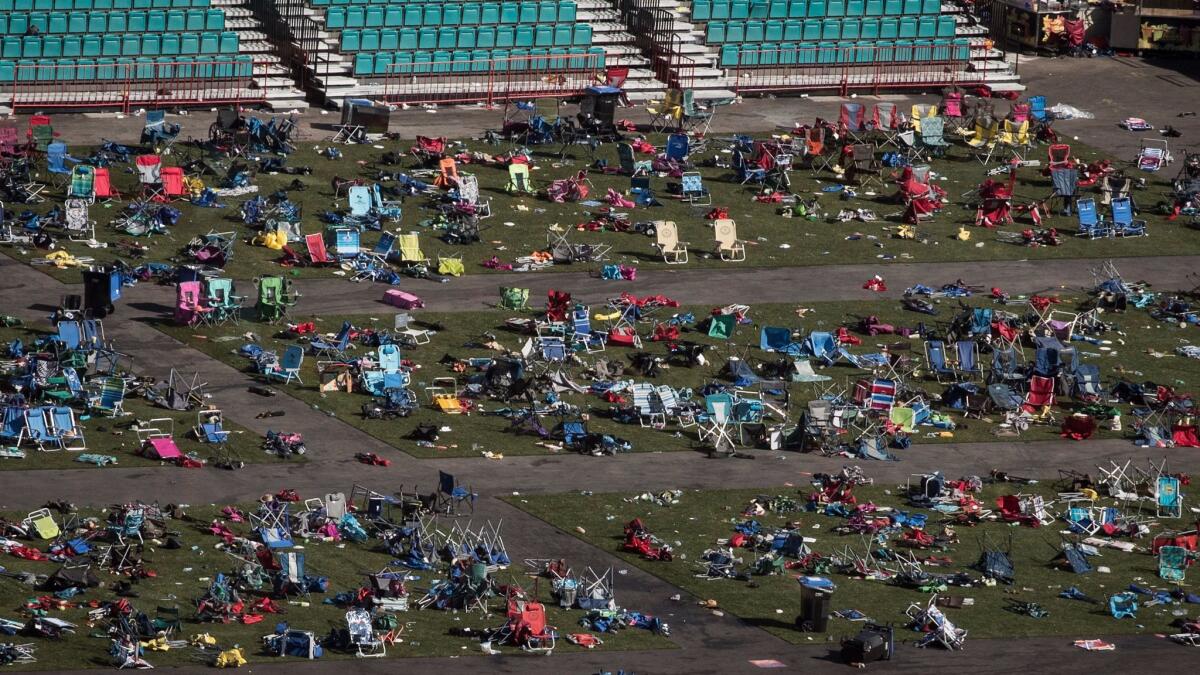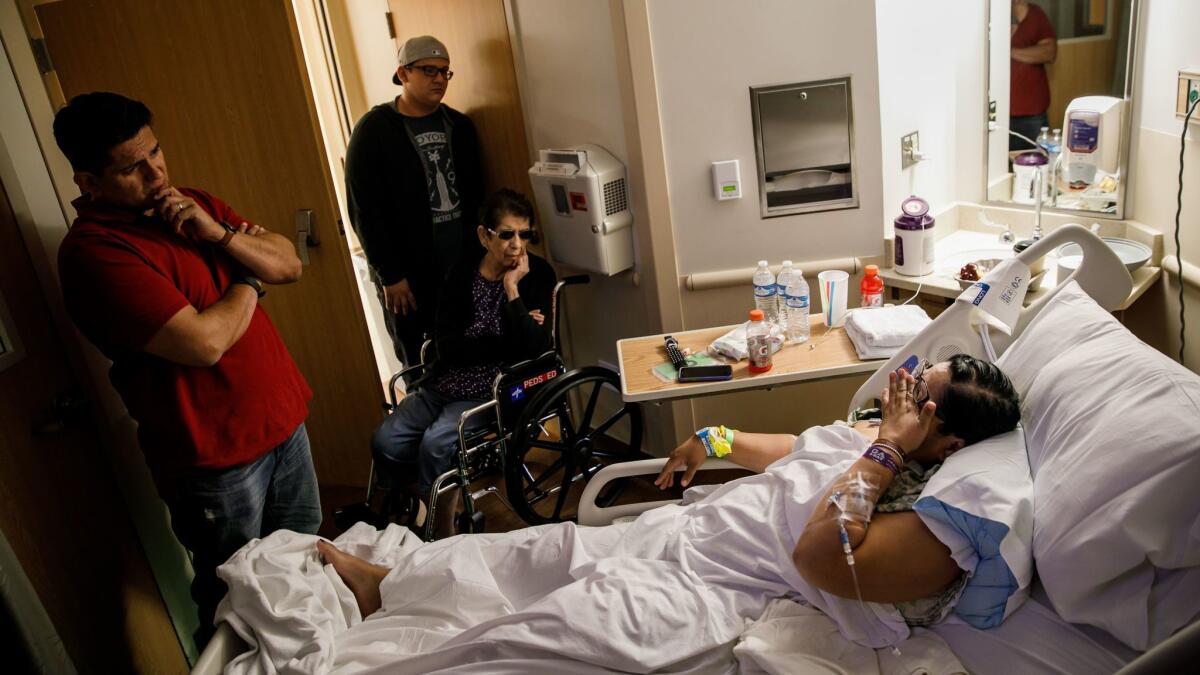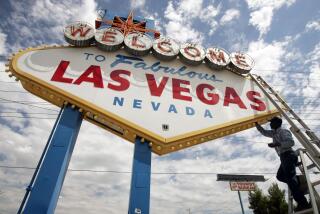Survivors from California recount their terrifying escape from danger in Las Vegas

- Share via
Reporting from LAS VEGAS — As the gunshots echoed and people began to drop around her, Carmen Alegria was certain her time was up.
“We’re going to die here,” the 41-year-old social worker thought. “We’re going to die.”
A gunman holed up on the 32nd floor of the nearby Mandalay Bay Resort and Casino tower was spraying a crowd of thousands of country music fans with bullets, killing nearly 60 people and wounding hundreds more.
Many, who like Alegria traveled to the Route 91 Harvest Festival from California, emerged with incredible tales of courage and survival.
Strangers ripped off their clothes to apply makeshift tourniquets to gunshot wounds. At least one was grazed by a bullet while giving someone CPR. Others drove through the gunfire, filling the beds of their trucks with bloodied victims they took to hospitals. Some threw themselves in front of loved ones, trying to save their lives and, in at least one case, losing their own.
Survivors from California spoke out this week, some from hospital beds awaiting or recovering from surgery, and shared details of their harrowing escapes.
“All I could describe it as was a war zone,” said John Kline, an officer with the Los Angeles Police Department who was on his third trip to the annual country concert. “There were people covered in blood.”
Soon after the gunfire started, Alegria, the social worker from Shafter, saw her best friend fall to the ground, shot in her left shoulder.
Alegria tore off the festival shirt she’d bought the day before and pressed it against Angelica Soto’s wound.
Seconds later, Alegria was shot in her left knee. She was bleeding badly. Bullets continued to fly. She was terrified.

But the women — who call themselves sisters — pulled each other up, held hands and ran east, taking cover behind vendor carts until they made it to a dirt lot where they hunkered behind vehicles with other concertgoers.
“Are you guys OK?” a woman asked. “I’m a nurse.”
She checked Soto and told her it was just a flesh wound. She’d be OK. Alegria’s knee — gushing blood — was much worse, the nurse said. A man took off his shirt and wrapped it around her wound.
The gunfire continued as concertgoers hid behind metal bleachers and Las Vegas police officers shielded others with their own bodies.
“We have to get out of here,” Soto told Alegria.
By this time, the pain from Alegria’s knee wound was registering. “I don’t think I can run,” Alegria answered. Later she would learn that her tibia was broken and her femur fractured.
Soto grabbed her hand.
“Come on, girl. I’ll drag you if I have to,” Soto told her.
Alegria hobbled as fast as she could to a nearby street, where a man who looked to be in his early 20s pulled up in a gray pickup.
“Who’s hurt? Who’s hurt?” the man yelled.
“We’ve been shot,” Alegria and Soto responded.
Two men lifted them onto the bed of the truck. “Oh my God. We’re safe,” Alegria thought to herself.
Then more gunfire.
The women scooted themselves closer to the truck’s cab and hid their heads under an attached toolbox.
Soto recited the rosary in Spanish. Alegria did the same in English. The women held on to each other as the truck’s driver stopped several times to pick up more people.
Men grabbed the injured and lifted them into the bed of the truck. “Bodies were literally being tossed on top of us,” Alegria said. Each jar ratcheted up the pain in her leg.
With more than half a dozen people in its bed, the truck sped toward Sunrise Hospital and Medical Center. The sound of gunfire finally began to fade.
About the same time, a couple from Chino heard the gunfire and ran. In cowboy boots, Jessica Leonard kept stumbling over abandoned shirts, purses and hats.
For a moment, she and her fiance, Anthony Crisci, took cover behind a metal cooler the size of a bathtub.
When bullets struck the cooler, it was time to move again.
Eventually, Crisci realized he’d been shot. He was bleeding badly from his left thigh. Leonard was hit too, just above her right rear pocket. Her phone was coated in blood.
Crisci called his parents, just in case he didn’t make it out alive.
“Pop. A terrorist is in Vegas. I’ve been shot,” he told his father, Tony Crisci, who lives in Chino Hills.
When he could no longer stand, he crawled. When he could no longer crawl, Leonard dragged him by his arms and — with the help of two strangers — made it to the street.
A red pickup pulled up. Leonard climbed in the main cab, as strangers lifted Crisci into the pickup bed that held at least 15 others. Most were injured. One, a woman with curly brown hair, was dead.
Crisci’s legs dangled out the tailgate as the truck careened down side streets, the horn blaring as they blew through intersections on the way to Desert Springs Hospital Medical Center.
When they got there, blood was smeared in the emergency room lobby. Some patients were lying on the floor. Some had gunshot wounds to their faces. Others to the chest, stomach and legs.
The couple are expected to recover. But the events keep replaying in Leonard’s mind. And Crisci keeps seeing the dead woman in the pickup.
Carcamo and Mather reported from Las Vegas, Tchekmedyian and Winton from Los Angeles.
ALSO
Girlfriend of Las Vegas gunman, a ‘person of interest’ in mass shooting, has landed in Los Angeles
The trigonometry of terror: Why the Las Vegas shooting was so deadly
Las Vegas gunman was a former IRS agent who ‘preplanned extensively’ for the attack
Las Vegas shooting victims: Portraits of the fallen
More to Read
Sign up for Essential California
The most important California stories and recommendations in your inbox every morning.
You may occasionally receive promotional content from the Los Angeles Times.














